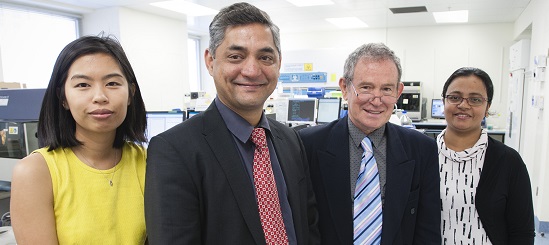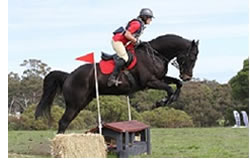AIFA announces 2016 research grants
The AIFA Board is pleased to announce two $10,000 grants, one supporting research into insect allergy treatment and the second that will improve development of a drug for allergy. Over the past 3 years AIFA has provided a total of $100,000 in research grants.
Jack Jumper Ant Allergy

Allergies to venoms from stinging insects are one of the most common causes of severe allergic reactions in Australia, and cause more deaths than shark attacks, yet they are rarely reported. Symptoms include an all-over rash, swelling of tongue or throat, difficulty breathing, abdominal pain, diarrhoea, vomiting or a drop in blood pressure.
A $10,000 grant has been awarded to a research project that will assess whether treatment for allergic reactions to Jack Jumper Ant stings is effective. The Chief Investigator is Dr Pravin Hissaria, with Professor Bob Heddle and Dr Adriana (Thanh-Thai) Le on the project team based at SA Pathology in Adelaide. The title of the project is "Assessment of the Basophil Activation Test as a tool for monitoring therapeutic responses to Jack Jumper Ant Venom Immunotherapy".
Allergic reactions to the Jack Jumper Ant are a uniquely Australian problem. Jack Jumper Ants (also known as Hopper Ants because of their jerky movements) live in underground nests. They are aggressive and often hunt alone. Allergy to Jack Jumper Ant venom is one of the most common causes of insect sting anaphylaxis in southern and eastern Australia. Around 3% of the population of Tasmania has experienced immediate, generalised allergic reactions to Jack Jumper Ant stings and about half of these reactions were potentially life threatening. Those most at risk are older people or those with severe breathing difficulties. This is also a problem that impacts people living and working in rural and outer urban areas.
 Sonja Klebe, who works in cancer research, moved into an Adelaide Hills property in 2005 and was stung 3 times within the space of 18 months by Jack Jumper Ants. The first time was a localised reaction, the second time her arm swelled up and by the third she was experiencing breathing difficulty, nearly passing out in the paddock. Alone in the paddock, this was a frightening and potentially fatal experience for Sonja.
Sonja Klebe, who works in cancer research, moved into an Adelaide Hills property in 2005 and was stung 3 times within the space of 18 months by Jack Jumper Ants. The first time was a localised reaction, the second time her arm swelled up and by the third she was experiencing breathing difficulty, nearly passing out in the paddock. Alone in the paddock, this was a frightening and potentially fatal experience for Sonja.
Fortunately, she works at Flinders Medical Centre, where Professor Heddle has given talks about the subject, so she was aware of the problem and sought help.
 "I used to always carry an EpiPen (adrenaline autoinjector) but I am quite active, ride horses and rock climb, so this can be difficult at times. Since the Jack Jumper Ant immunotherapy, I have not had any systemic reactions. Avoiding outdoor activities has not been an option for me, and Jack Jumper Ant incidents have not been limited to the Hills. I have been stung in the carpark at work, with an ant sitting on my car door handle, apparently just waiting for me!" Sonja has been on immunotherapy for 5 years and it has been effective for her in managing her allergy.
"I used to always carry an EpiPen (adrenaline autoinjector) but I am quite active, ride horses and rock climb, so this can be difficult at times. Since the Jack Jumper Ant immunotherapy, I have not had any systemic reactions. Avoiding outdoor activities has not been an option for me, and Jack Jumper Ant incidents have not been limited to the Hills. I have been stung in the carpark at work, with an ant sitting on my car door handle, apparently just waiting for me!" Sonja has been on immunotherapy for 5 years and it has been effective for her in managing her allergy.
Venom immunotherapy involves giving the body gradually increasing doses of Jack Jumper Ant venom in a vaccine and reducing the chances of a severe allergic reaction to a future sting. The purpose of this study is to assess the usefulness of a blood test, called the Basophil Activation Test, as a tool to predict the effectiveness, ongoing protection, and treatment related side effects in patients receiving Jack Jumper Ant venom immunotherapy. There is currently no reliable test to judge whether this treatment has worked apart from a live sting challenge, with all the inherent dangers involved.
The study has potential benefits for people with other allergies. Establishing the effectiveness of this test for allergen tolerance would allow it to be used in other allergic conditions like food and drug allergies, reducing the need for costly and potentially dangerous allergen challenges, which can only be performed in a few specialised centres.
Further information on allergy to insect stings, including Jack Jumper Ant allergy:
www.allergy.org.au/patients/insect-allergy-bites-and-stings/allergic-reactions-to-bites-and-stings
www.allergy.org.au/health-professionals/papers
AIFA Start Up Grant – Developing a tool for screening for allergy that will improve drug development
Reversing the rise of allergies is an important unmet challenge of modern medicine and a problem that Dr Ben Roediger seeks to address. Dr Roediger, a research immunologist and Head of Skin Inflammation Group at the Centenary Institute in Sydney, has been awarded an AIFA grant of $10,000. His project has the potential to lead to better treatment for many types of allergy. He admits it is an ambitious project. The AIFA grant will give him the start he needs.
Recent research has provided an excellent understanding of how allergy works at a cellular and molecular level. Immunoglobulin E (IgE) binds to allergens in the environment, which activates a receptor called FcER1. Despite knowing the critical role this process plays in allergic reactions, there are no drugs that specifically target the FcER1 receptor.
Screening for new drugs is limited by the nature of the assays (tests) used to develop them. Very few assays are designed with allergy in mind, which has held back the development of highly targeted drugs that could help sufferers of allergic disease. Most drugs that treat allergic conditions act broadly, carpet bombing the problem and causing other collateral damage or side effects. Currently, there is an urgent unmet need for the development of highly targeted drugs that could help sufferers of allergic disease with few side effects.
The innovative tool is a novel cell line that makes use of fluorescence to shed light on the dynamics of protein interactions that drive allergic reactions. A fluorescence-based technology known as BiFC (bimolecular fluorescence complementation) will enable scientists to directly study the FcER1 receptor and fast track drug development for the treatment of allergic disease. This project may also serve as a template for future drug screening strategies targeting other diseases.
Dr Ben Roediger combines cutting edge technology with sophisticated models to visualise and functionally characterise immune cell function. He has over 10 years' experience in biomedical research, with a broad understanding of cell biology, haematopoiesis, inflammation and immunology and a primary research focus on understanding atopic disease, particularly atopy in children.
Dr Roediger is an acknowledged expert in cutaneous immunology whose research contributions are evidenced by 23 original articles (16 in the last 5 years), the majority of which are in leading international journals including Nature Immunology, The Journal of Experimental Medicine, Proceedings of the National Academy of Sciences of the USA, Journal of Investigative Dermatology and Journal of Immunology.
AIFA is proud to recognise the potential importance of Dr Roediger's work.
AIFA grant applications for next year will open in March 2017.
Information about these projects and previously funded projects can be found on our website www.allergyimmunology.org.au/projects